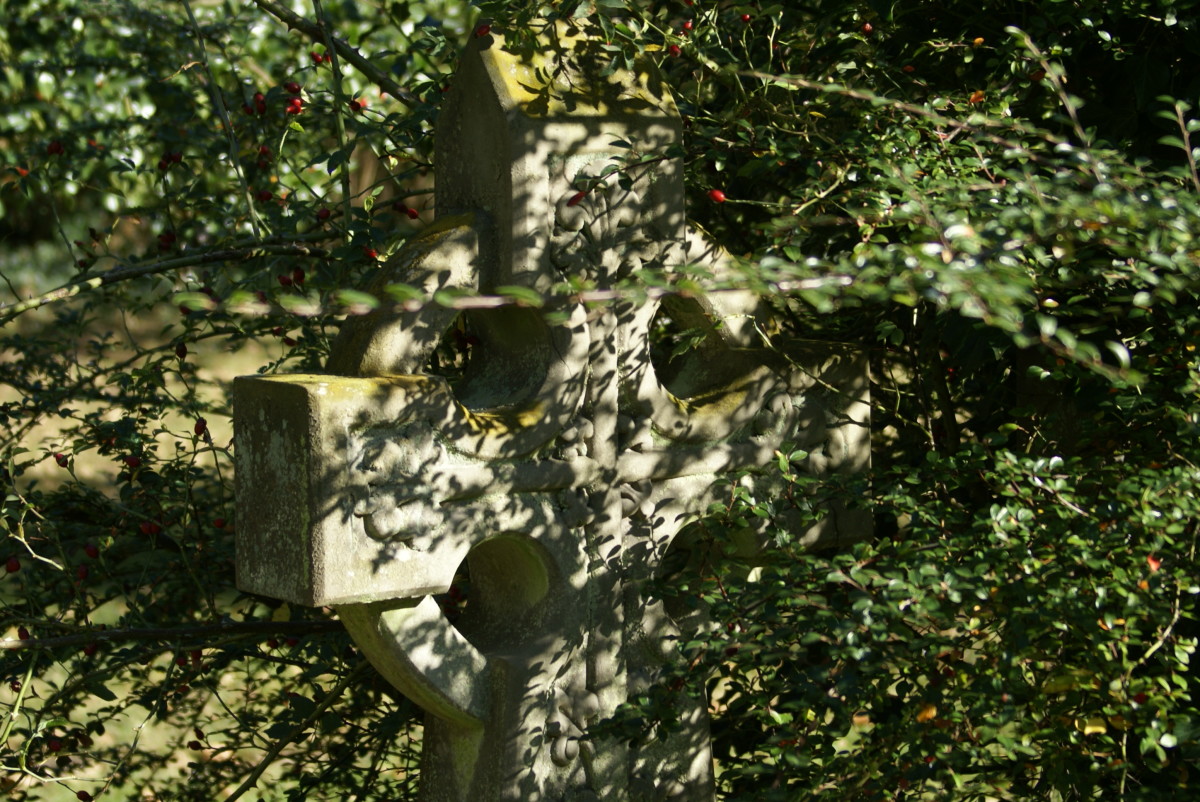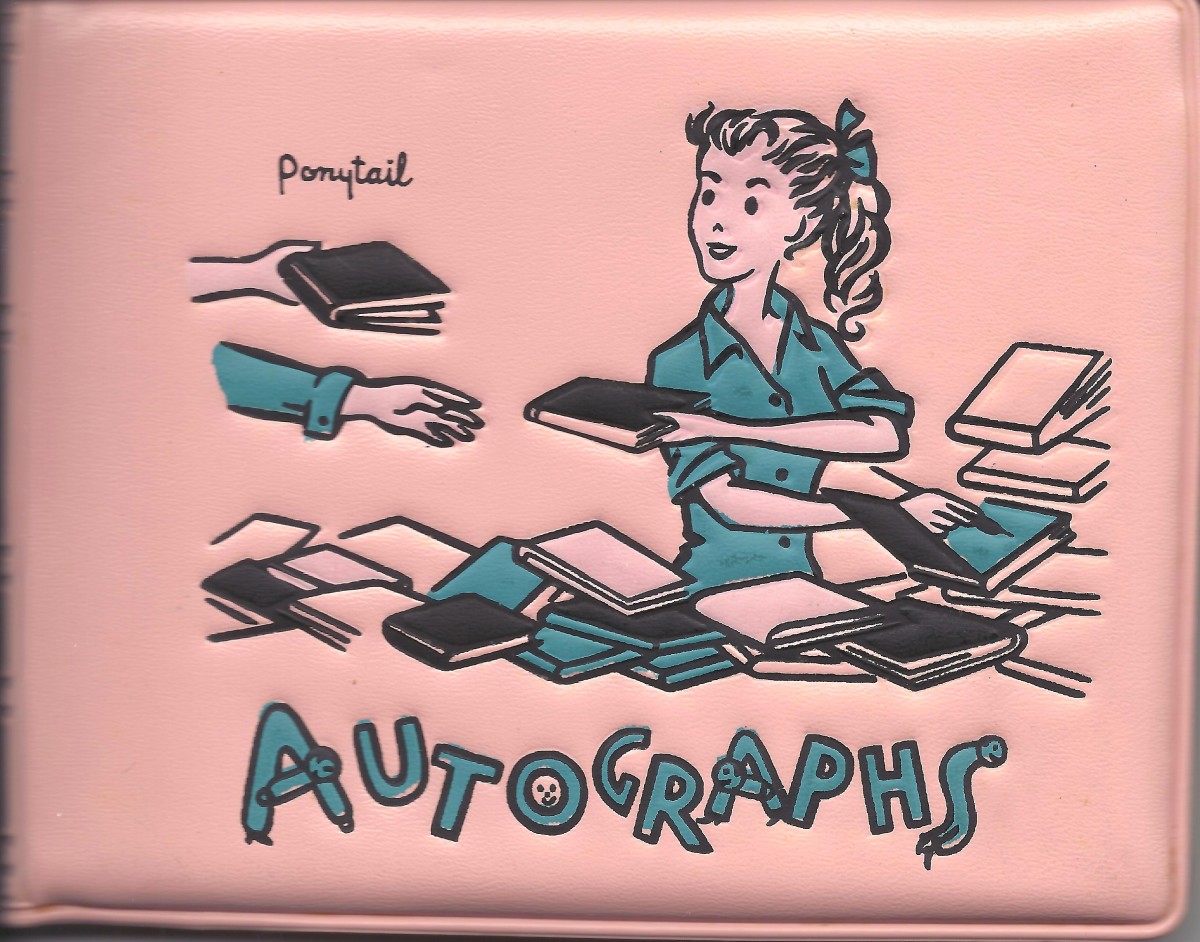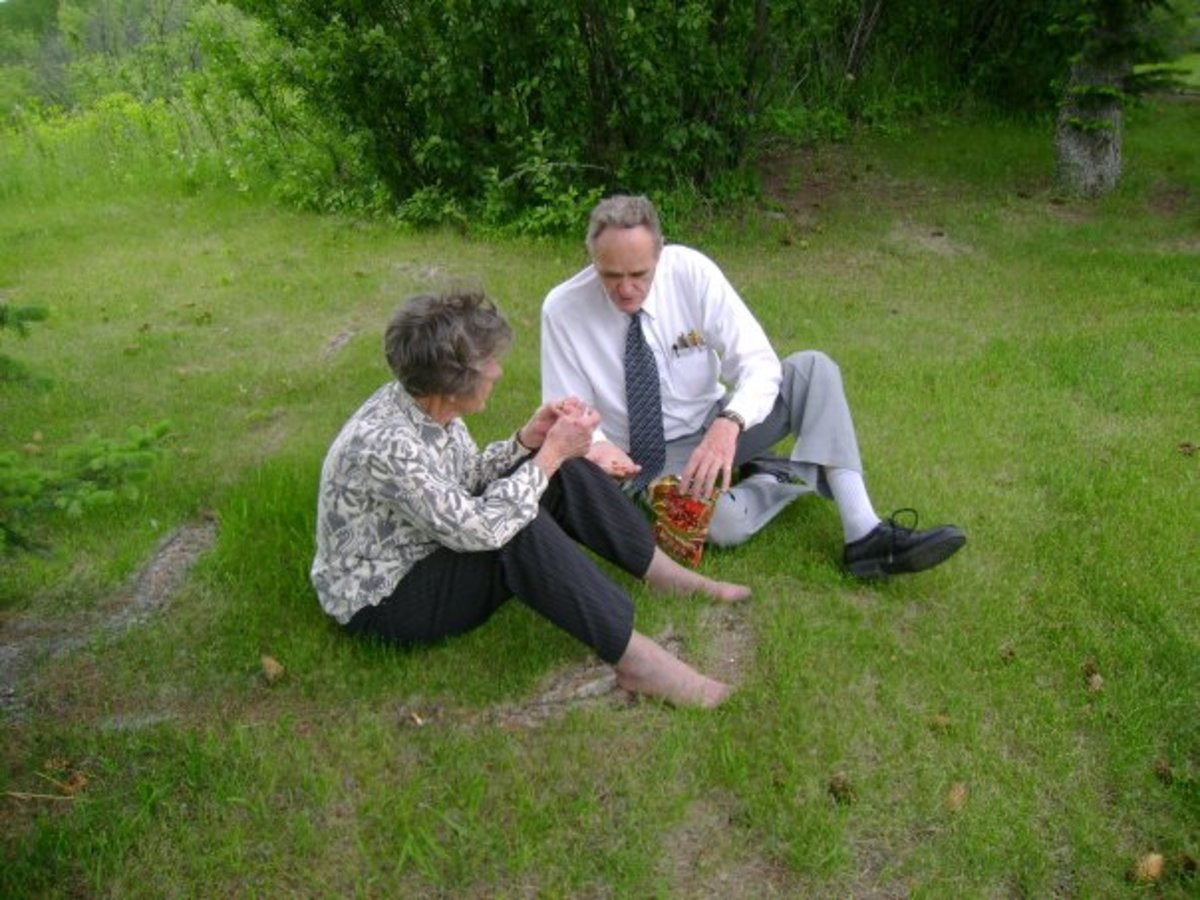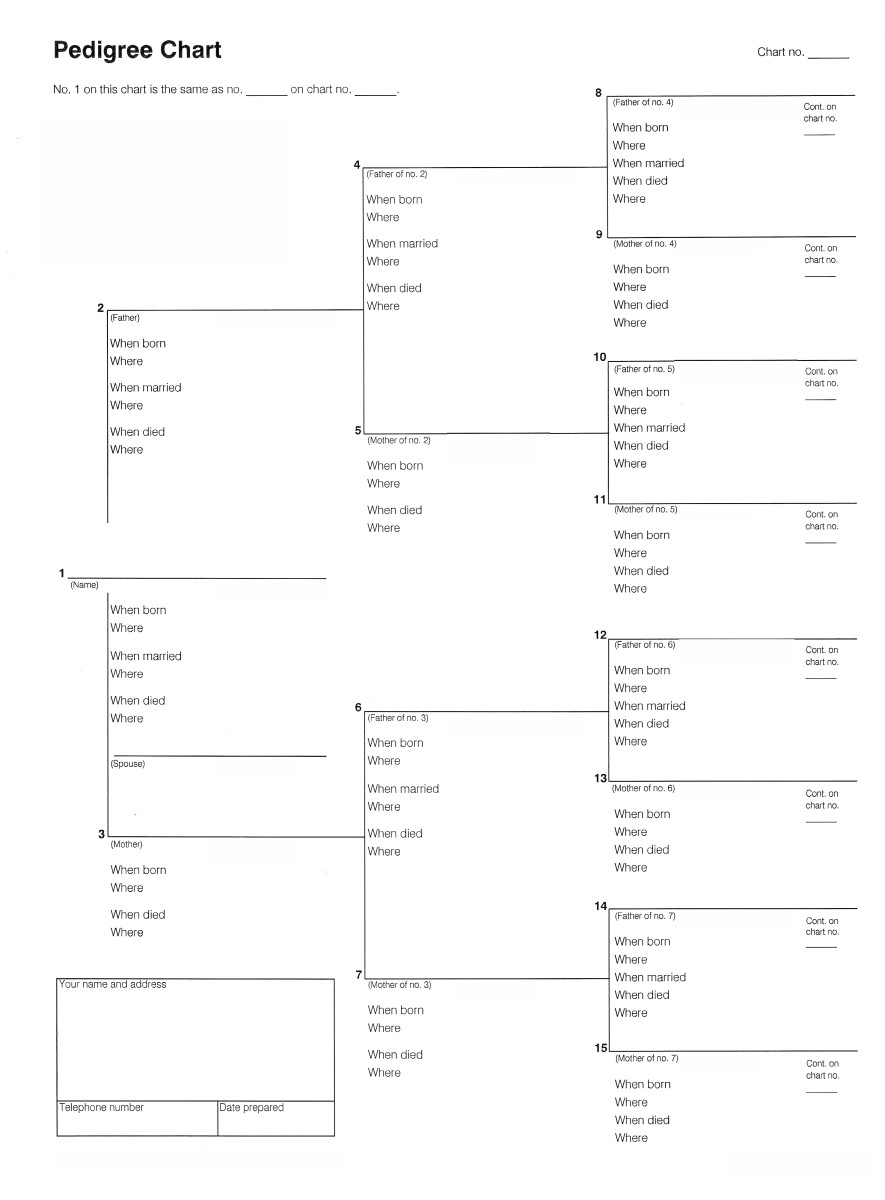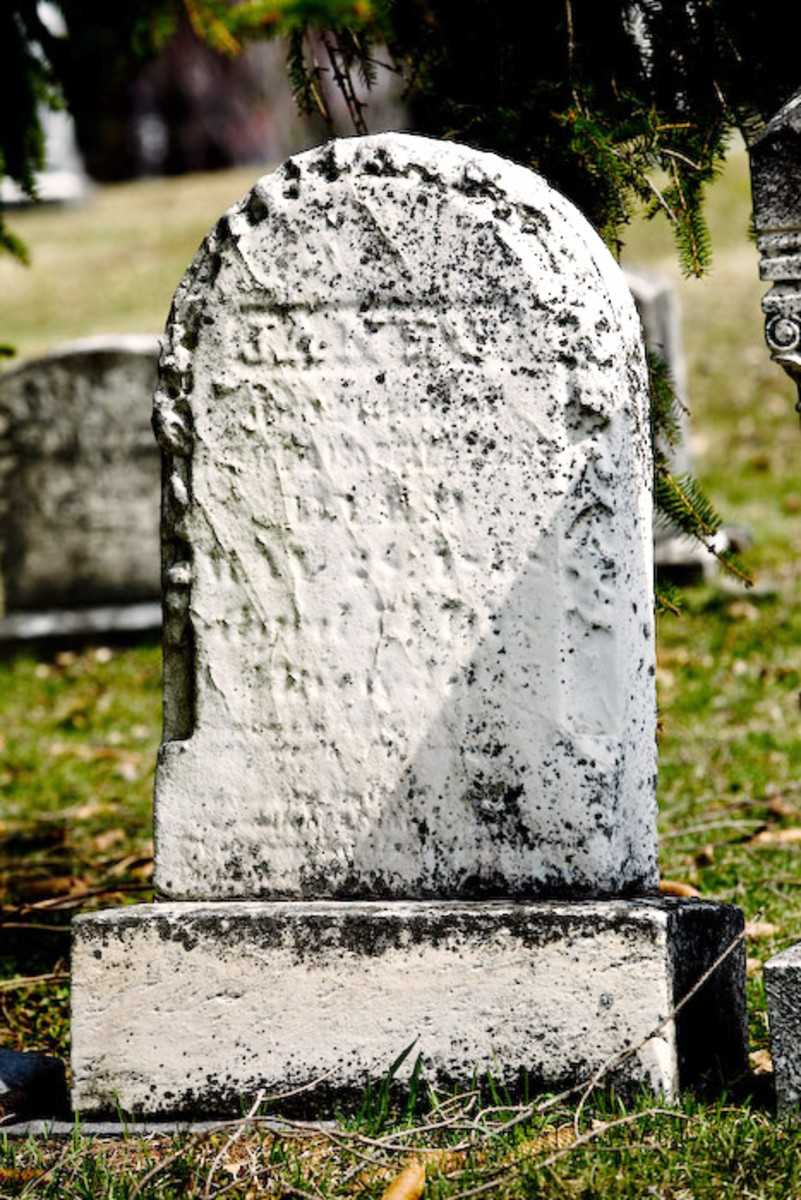How to Travel Back in Time and Change History
Time Travel
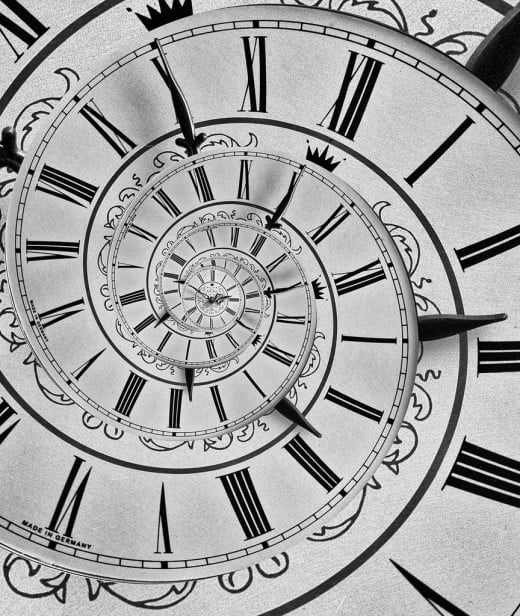
Childhood Regrets
I wish I had a time machine. I would love to go back in time and correct the mistakes of my youth. Not that I have any major regrets, but there are certainly some things I could do better if I had the opportunity to get a do over and there are also some moments in my life I wouldn't mind experiencing again.
Unfortunately, time travel isn't possible. But the next closest thing is a deep dive into history, and more specifically genealogy and family history. It's the next best thing to time travel, and although you won't be able to change history, if you dig deep enough, you are likely to change your own perception of history forever.
One of my regrets in life is that I never really knew either of my grandfathers. My father's dad was long gone, having left my grandmother when my father was just a boy. My mother’s dad, on the other hand, was always in my life. Unfortunately, I still never really got to know him because he suffered a series of massive, physically debilitating strokes when I was quite young. Even though I had met him and visited his home regularly, his physical handicaps made it nearly impossible for a young boy to know his grandfather the way most children do. His body didn't work the way it was supposed to. He slobbered a lot, because he couldn't even fully close his mouth when he was at rest. To my seven year old brain, he was scary, messy and not someone whose lap I might want to sit on.
As a young child, that never really bothered me too much. It wasn't until later in life that I really began to understand what I had missed out on. After all, as a young boy I had better things like playing to do. Grandma always spoiled all of us grand kids every chance she got, so the fact that grandpa pretty much sat in his chair most of the time didn’t bother me was just fine.
As I grew older, chasing butterflies and doggies turned into chasing girls and fast cars. I was still too busy with my own agenda to care about the fact that grandpa was a war veteran with lots of stories to tell, until one day I myself became a war veteran. I was deployed to Iraq during the Persian Gulf War. Soon after my return, I got married and settled down with kids of my own, and I began to understand what truly being busy was like. My life was now truly hectic, and I still didn't make time to get to know grandpa, in part, I suppose because I barely had time to sleep. The years went by, and although I still visited my grandfather's home from time to time, I still never really got to know him.
On November 23,2005, time ran out. My grandfather, Ralph Fred Rawlings, passed away.
My Paternal and Maternal Grandfathers
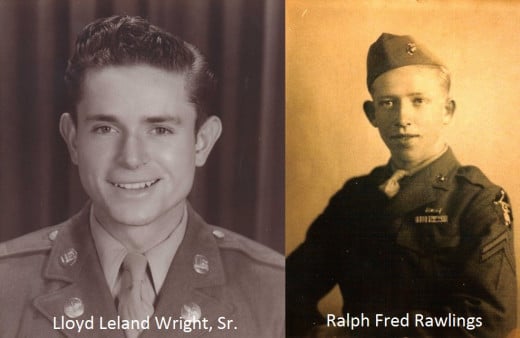
Part of My Pedigree Chart
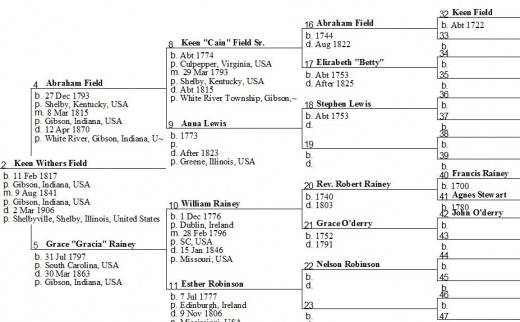
Discovering Family Roots
After my grandfather’s death, I became interested in family history. My son had been assigned a school project just months after the funeral. He was instructed to write a report on the country that his immigrant ancestors came from? My son, turned to me to ask what country we came from, and I gave him somewhat of a dumb look. I never thought of myself as anything other than an American. My dad had no family around after his mom died in 1980, but I knew that my maternal grandmother had once owned a book about the Huether family from Germany. We were somehow descendant from them, but I didn't know the details, and my grandmother had died years before my grandfather did. I had no idea who had the book today, so I called mom to ask if she could help.
My parents did have the book, and had also done a little online research for my grandfather's funeral announcement. They laid out a genealogical trail for me that took my ancestry all the way back to the late 1500s in Scotland and Ireland. I was astonished. I had no idea we even knew anything about our family history past grandma and grandpa. I mean I guess I always knew that mom knew her grandparents, but I never really bothered to ask about them. I had asked about my dad's side of the family, but due to his dad leaving at such a young age, I was quite sure we knew of no Wright’s we were related to. Still, it made me wonder how much I could find if I started to look.
Armed with a maternal family line all the way back to the 1500’s, I decided to download a family tree program and start putting together a more detailed family tree. I started with myself, my parents then grandparents and then added in all my aunts, uncles and cousins. Then I started expanding that to other relatives that I knew very well. I also added the impressive line all the way back to the 1500's, just as my parents had told me about.
Since then, family history has been a virtual obsession, but one that has rewarded me with numerous finds, and a new appreciation for history. Had I not begun my research into my roots, I would never have learned that one of my grandfathers died during the Civil War, or that several of them fought for our nation’s freedom in the Revolutionary War. I would never have learned that I am related to such famous names as Wyatt Earp, George H.W. Bush, George W. Bush, and Jimmy Carter. And I never would have found close family connections to Elvis Presley and Abraham Lincoln.
More importantly, I would never have known that my dad’s father lived in Saint Louis, served in the Korean War, had other children, and died in 1996 or the my grandpa Rawlings had lied about his age to join the fight during World War II where he earned a Purple Heart after being shot in the arm on during a D-Day style beachhead assault in the Solomon Islands.
Researching family history became my time machine. I was a time traveler, if only virtually, and history for me was changed once and for all. I could never look at historical events the same way again, because I had learned that my family created some of those events. My perception of history had changed forever.
For me, researching my family roots wasn’t too awfully difficult. You see, I work in information technology. Internet research was a cake walk for me, and I was able to quickly learn all kinds of details online about distant family members. I quickly mastered searches on Ancestry.Com, and eventually stopped making trips to the library to use their computers and purchased my own Ancestry account. I may have adapted easily, but as a new researcher with very little guidance from experienced genealogists, I made some very big rookie mistakes that many new genealogists make. I have also made some interesting discoveries that have literally changed how I perceive history. The remainder of this article will attempt to document some of the more interesting tidbits, and hopefully help you discover how to avoid the pitfalls I fell into, and find some new ways to discover your own family history.
Spelling, Handwriting and Transcription Errors
Spelling errors on public records are very common. We take literacy for granted these days. Most people can read and write, mostly effectively. But anyone who spends time on Facebook knows that between typos, commonly misspelled words, and slang, spelling is not everyone's best subject.
Census records commonly misspelled names. Often the census taker wrote the names down exactly as they sounded. They interviewed the families at the home and often there would not be any single family member who could read or write. The result, is people did not even know how to spell their own name. Therefore, the census taker would write down the name as it sounded. Thus, my family surname of Huether, pronounced Hutter or Heater depending on individual accents could have been spelled as Huether, Heather, Heater, Hutter and other variations.
In addition to spelling errors at the time the census was taken, we also have to deal with transcription errors as these handwritten documents are transcribed and converted into searchable databases. Many original source documents are faded and almost invisible. Others have poor handwriting that is difficult to decipher. All of this can lead to some very frustrating moments of searching for families that you know exist, but can't seem to be found anywhere.
I spent years searching for the family of my 2nd Great Grandfather, Daniel Voorhees Wright on the 1900 Census. I had found him on the 1910 census, so I knew he was alive on the 1900 census. I also had his marriage record from 1883 in which he married the same woman he was still married to on the 1910 census. However, I could not locate Daniel, his wife Lily, or any of their children on the 1900 census. Then one day, I stumbled on the record when I was searching for one of his children, by first name and City/State only.
The family was recorded under the surname "Wrght". The name had no vowels, which should have been a tip-off to whoever recorded it that this was the product of poor handwriting. The "i" in Wright was probably partially overwritten by the "g" or had been rubbed off over time. Having found the record, though, the mystery was solved, it all made sense why I couldn't find them.
The Family of Daniel Voorhees Wright on the 1900 Census
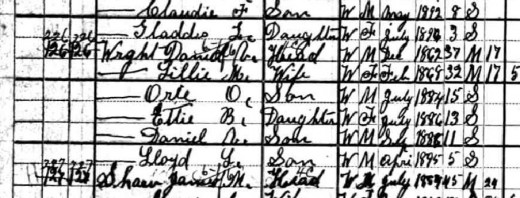
Write Down Everything
Spelling errors aren't only caused by census takers, poor transcription or bad handwriting. Sometimes, the illiteracy of our own ancestors contributes to the problem. For example, on my dad's side of the family, my great grandaunt Sarah misspelled her own surname as "Cridder" instead of "Crider" on numerous records. This misspelling was consistent for many years, including death records in which she was listed as the informant. However, later in life, as she became more educated, the spelling errors were corrected. Those early records, however, still contain the same consistent misspelling of her own surname.
Sometimes, our names aren't just misspelled. They are just completely wrong.
My last name could have been Johnson. When my father was growing up, he was poking around in his mother’s room, probably looking for cigarettes or some other kind of trouble, when instead; he found his own birth certificate. What was odd to him though, was the name was different than what he had thought.
You see, my father had been going by the name of Lloyd Johnson, but this birth certificate listed a boy who shared his exact birth date and place, shared his mother, but the name on the birth record was Lloyd Wright. Where the father's name should be was a man who was also named Lloyd Wright. Wilburt Johnson was the man my father had called daddy. My father, realizing that his mother couldn't possibly give birth to twin boys from two different fathers realized in a moment that the man he knew as his father was actually his stepfather and his last name was "Wright". He also realized that he was named after a father he didn't even know.
My Dad confronted his mother about the birth record, and she confessed it all to him. His real dad, Lloyd Leland Wright, Sr. had left his mom when my father was but 1 year old. When she remarried, her new husband raised Lloyd as his own, and she let him call him dad, figuring that one day, she might tell him the true story of his heritage.
As a genealogist, knowing this bit of history, it may be easier to find my father as a child because I may have to look for records under Lloyd Johnson as well as Lloyd Wright. It will be interesting to see what I find when the 1950 census becomes available. Which name will my dad be listed under?
A Typical 1910 Census Page
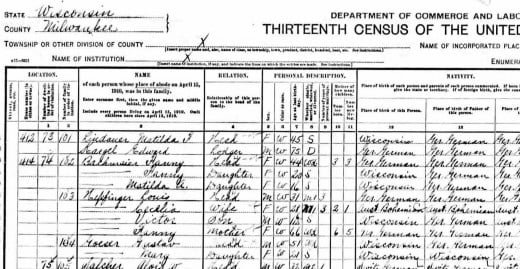
Document Your Source
Source records are crucial, but new genealogists seem to always forget this. It seems unnecessary to document your own birth date, for example. I mean, let's face it. If you don't know your own birthday, then your history is shrouded in mystery to begin with.
But even if the only source you list is yourself or your parents names, that is better than nothing. For example, my great aunt Sarah always told us what her birthday was. She said she was born in 1898 on the 12th of August. She also told us that her mother, Susan Elizabeth Isom was a full blooded Cherokee Indian.
In all my research, I have not yet confirmed either of these facts. However, there is sufficient evidence to suggest that Sarah was born in 1898 because the 1900 Census lists a Sarah L. Crider as being born in August of 1898. So, I have two sources of proof. Sarah's own statement that I was born on this day, and a public record that confirms the month and year, but not the day. The two sources together, allow me to offer sufficient proof that Sarah was born on the 12th of August, 1898.
Proving that my great aunt Sarah's mother is a Cherokee Indian has been a whole challenge altogether. I have been absolutely unsuccessful in locating any documented evidence of this other than Sarah's word. There is no reason not to believe her, but there is also an absence of proof. That means, that if evidence does exist, it is not easy to find and it is not obvious. But if I had not documented that Sarah said this, I wouldn't even be looking for such a record.
One thing is for sure, my sister was named after our Cherokee ancestor, and as this information has been passed down to us, we still believe it to be true. Also, I have a photograph of one of my great grandmother's dressed in traditional Indian clothing. The story sure has merit, even if it remains unproven.
Family Legend Says W.C. Fields is Related To My Family
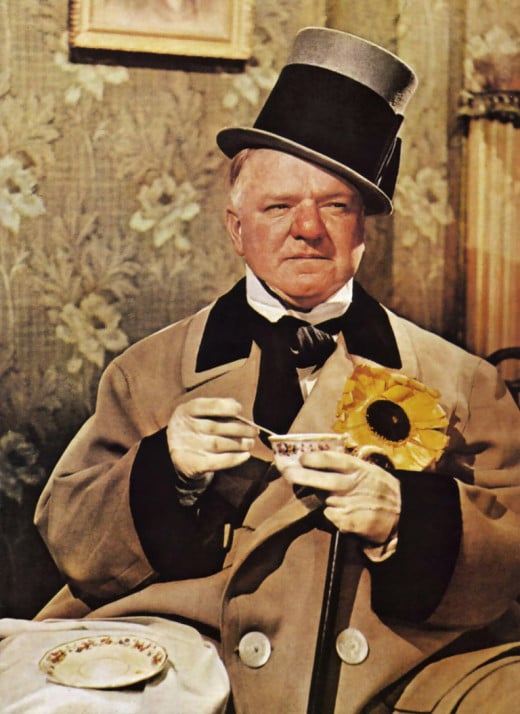
The Lies We Tell Ourselves
Just because a story is passed down from generation to generation doesn't always make it true. On my mom’s side, we’ve always been told we were somehow related to W.C. Fields. We are in fact descendants of the Field surname which adds merit to the story. All of my aunts and uncles corroborate this story, as it has been passed down to them. In fact, several have asked me if I have found the connection yet that they are sure exists.
I have not found any connection at all. In fact, it seems unlikely that I will. W.C. Fields shortened his surname from Dukenfield to Fields. I have not found anyone with the Dukenfield surname in my family tree to date. Just because I have not found the link, doesn’t totally discredit this family legend as out and out lies. There may be elements of truth yet undiscovered. There could be some wishful thinking, or an embellished story that somehow survived and was passed down from generation to generation. Either way, when you hear stories, take them all with a grain of salt. Document them for posterity, but be skeptical until you can prove they are true. After all, the "fact" is that there is a family legend that we are related to W.C. Fields. I can safely document that without stating that the legend is true.
Some Secrets Are Secret For A Reason

Take Nothing For Granted
Sometimes, a lack of factual information causes us to misinterpret history. One of my mom’s sisters is mentally handicapped. She has always been that way, at least as far as I remember. I had always just assumed this, having never been told otherwise. However, when I started researching family history, one of my aunts saw that I had stated that my hand was handicapped from birth in her bio. She quickly corrected me and explained her sister had come down with scarlet fever as an infant. This of course, happened years before I was even born. My presumption about her handicap had been incorrect. It wasn't something that ever really came up. We never as a family talked about how she came to have her disability. Had I not documented wrong, and had my aunt who knew the truth not read it, I may never have corrected this piece of information, and may have always assumed wrong that my aunt was handicapped from birth.
Sometimes, we take things for granted because we have been lied to in order to protect someone's integrity. During my research of one of my relatives revealed to me in confidence that the person I had listed as her father was not her natural father. Her mother had engaged in an affair with another man years before, and she was the child of the other man and her mother. However, many in the family do not know about this, and she has always grown up to call her mom's husband her father. The real father, has never been in the picture, and remains undocumented in my tree.
Such revelations may never be revealed without DNA testing, but in this case, they family was pretty open about it, but asked me to keep the information private. I have documented it in my family tree, but have not published the particulars out of respect for the family. In the future, after all concerned parties have been long ago laid to rest, perhaps then the information can be published. For now, it remains locked away in my database as a hidden record.
Genealogy Poll
How many generations back does your family tree go?
WorldConnect Project Contains Thousands of Databases
Importing Other Researchers Work
There are lots of publicly available GEDCOM databases online where you can freely view and download the work of hundreds of other genealogists. These are an excellent resource, but they can also introduce some serious problems if you blindly import all of their work into your own family tree.
When you are importing the work of others, you are presuming that the information they have researched is correct. Don't make that assumption. Redo the research yourself. Often, they have errors, or pieces of information that are not properly documented or sourced correctly. That doesn't mean you can't import the data, just be prepared to verify it, correct any errors you find, and report back to the original researcher any recommended changes based on your own research.
Also, import sparingly. Only import small branches of a tree instead of the entire tree. I made this mistake early on, and as a result, my database contains over 130,000 names. Much of the information is accurate, but so much of it has problems that it is sometimes difficult to sift through and correct them. I also didn't source the imports all of the time, so now, when someone asks me where I found a piece of information, I have no answer other than I imported it from someone else.
Plan Ahead
Finally, plan ahead. Your research in family history is important. You are documenting your family's history, and that history can be passed down for generations to come. Your great, great, great granddaughter may one day be studying the very research you started. Give them a good start, and document as much as possible. Your research should outlive you, so make sure your family knows about it, and knows to pass it down.
Genealogy is far more than names, dates and places. There is an emotional connection filled with character and personality. It represents who we are and why we are the way we are. It is rooted in traditions like dinner every Sunday at Grandma's house, and a family recipe that has been passed down for generations.
If you have already started your family tree, you have already begun to discover that history is more personal than you ever imagined. If you haven't, start researching today. You may just find that you really can travel back in time, and history will never be the same.
Genealogy Links
- Genealogy, Family Trees & Family History Records at Ancestry.com
Discover your family history and start your family tree. Try free and access billions of genealogy records including Census, SSDI & Military records. - RootsWeb.com Home Page
RootsWeb - the Internet's oldest and largest FREE genealogical community. An award winning genealogical resource with searchable databases, free Web space, mailing lists, message boards, and more. - Family Search by the LDS Church
Discover your family history. Explore the world’s largest collection of free family trees, genealogy records and resources.




